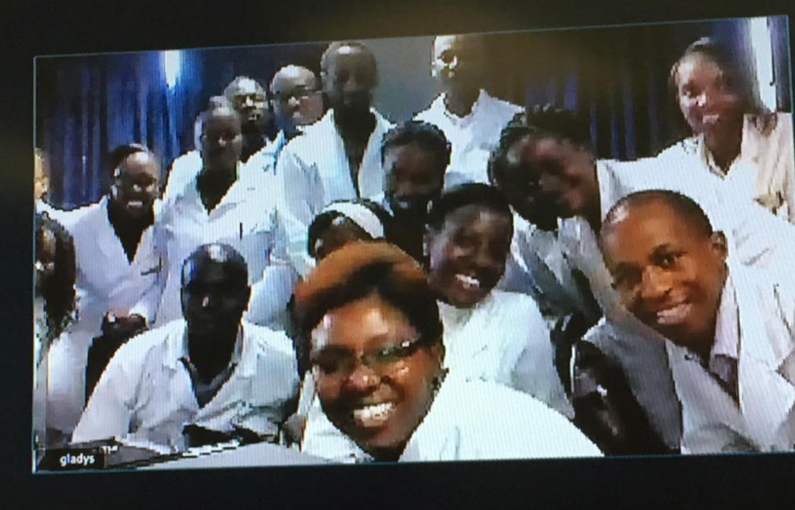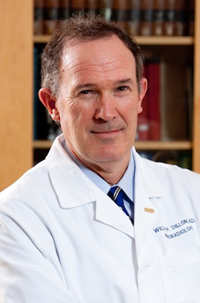RISE: Radiology International Student Educational Platform Allows Global Teaching; Launches at RSNA
A technology platform that enables live virtual radiology lectures for international radiology residents is among the first grant recipients of “Inspire-Innovate-Invest, The Campaign for Funding Radiology's Future®.”
The campaign is an ambitious effort by the RSNA’s Research & Education Foundation to raise $17.5 million to bridge the gaps in funding for promising researchers and educators. It was launched at the RSNA convention a year ago, and the R&E Foundation reported at this week’s 2015 convention in Chicago that it is funding 92 initial grants this year for a total of $3.6 million.

Among these first-year awards is an Education Scholar Grant to UCSF’s Bhavya Rehani, MD, for the Radiology International Student Education platform (RISE).
“RISE is inspired by the unmet needs in radiology education worldwide,” said Dr. Rehani. “The entire continent of Africa lacks neuroradiology and other subspecialty training. Thus trainees have to travel outside Africa to train further. The question was, could we develop an innovative sustainable solution to help? This led me to develop RISE.”
RISE is a radiology-teaching platform providing live virtual interactive training. The RISE technology platform allows radiology trainees at the University of Nairobi, Kenya, to tune in during live lectures at UCSF and other participating institutions in the U.S. It also provides access to recorded lectures for self-paced learning.
“We chose the University of Nairobi to start for several reasons,” said Dr. Rehani. “We had met few visiting trainees from the University and knew they had the infrastructure, a passion to learn, and a large 40-resident radiology residency program. The aim is to expand to other sites globally after this pilot project.”
Dr. Gladys Mwango, a member of the radiology faculty at the University of Nairobi, is collaborating with Dr. Rehani in implementing the RISE platform at her institution. She said radiology students in Kenya lack opportunities beyond a basic radiology education.
“We are all general radiologists and are yet to develop the different radiology specialties and fellowships,” said Dr. Mwango. Further training requires leaving the country. Some students can’t afford this, but the larger obstacle is the time it takes away from furthering other studies.
“We have a lack of capacity for sub-specialist training. That and the unavailability of fellowship opportunities in the region contributes to underdeveloped imaging protocols and guidelines,” pointed out Dr. Mwango.
Dr. Rehani said there were technology and other challenges to overcome before the RISE platform could be implemented. She worked closely with the Center for Digital Health and Innovation and UCSF Imaging IT to solve these logistical issues. “We went through various iterations of the platform until it worked.”
 “This wouldn’t have been possible without Dr. Bill Dillon,” said Dr. Rehani. “He was with us every step of the way, helping us make this work. He had a huge role in the success of this project.”
“This wouldn’t have been possible without Dr. Bill Dillon,” said Dr. Rehani. “He was with us every step of the way, helping us make this work. He had a huge role in the success of this project.”
The team at UCSF Imaging included IT staff members Pranathi Sundaram and Martin Rawlings-Klein, radiology residents, including Lindsay Lusby and Chris Mutch, and medical student Isaiah Brown. “It was inspirational to see the dedication of everyone in making this work,” said Dr. Rehani.
Dr. Mwango said, “When the cameras finally came on for the first class, on stroke imaging, and the images were finally transported, everyone gasped in amazement.
“As a department, we are very excited about the developing UoN-UCSF collaboration as it will not only indirectly expand our teaching faculty in the different radiology subspecialties, but will assist us in Kenya to benchmark and see ways in which we can achieve sustainable improvement.”
More information about the project can be accessed at www.risemed.org. The website was developed by Dr. Rehani and launched at RSNA 2015. The website received 5,000 views and one of the top tweets at RSNA just within few hours of launch.“This is just the beginning. Hopefully, we will be able to help more people through RISE,” said Dr. Rehani.
